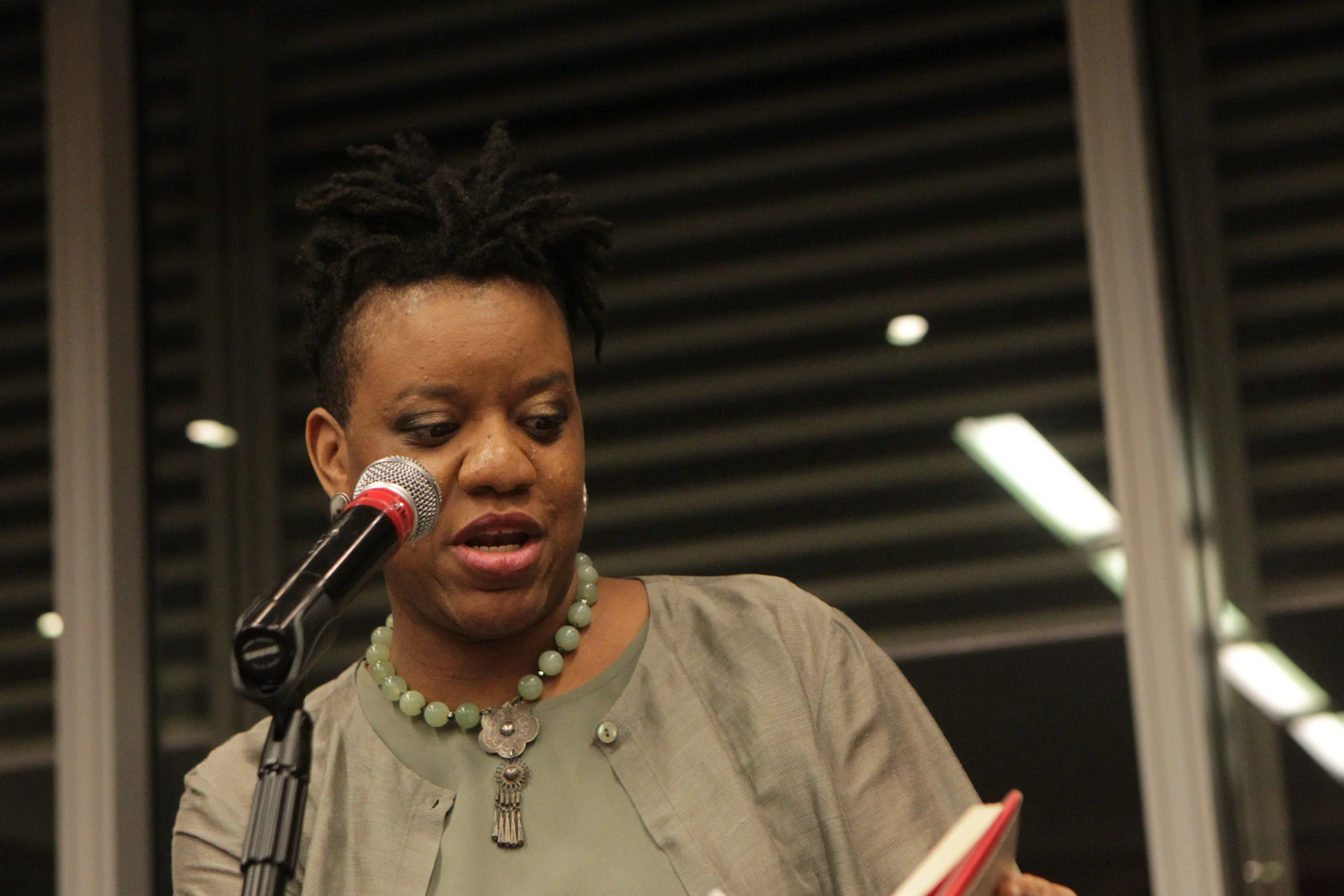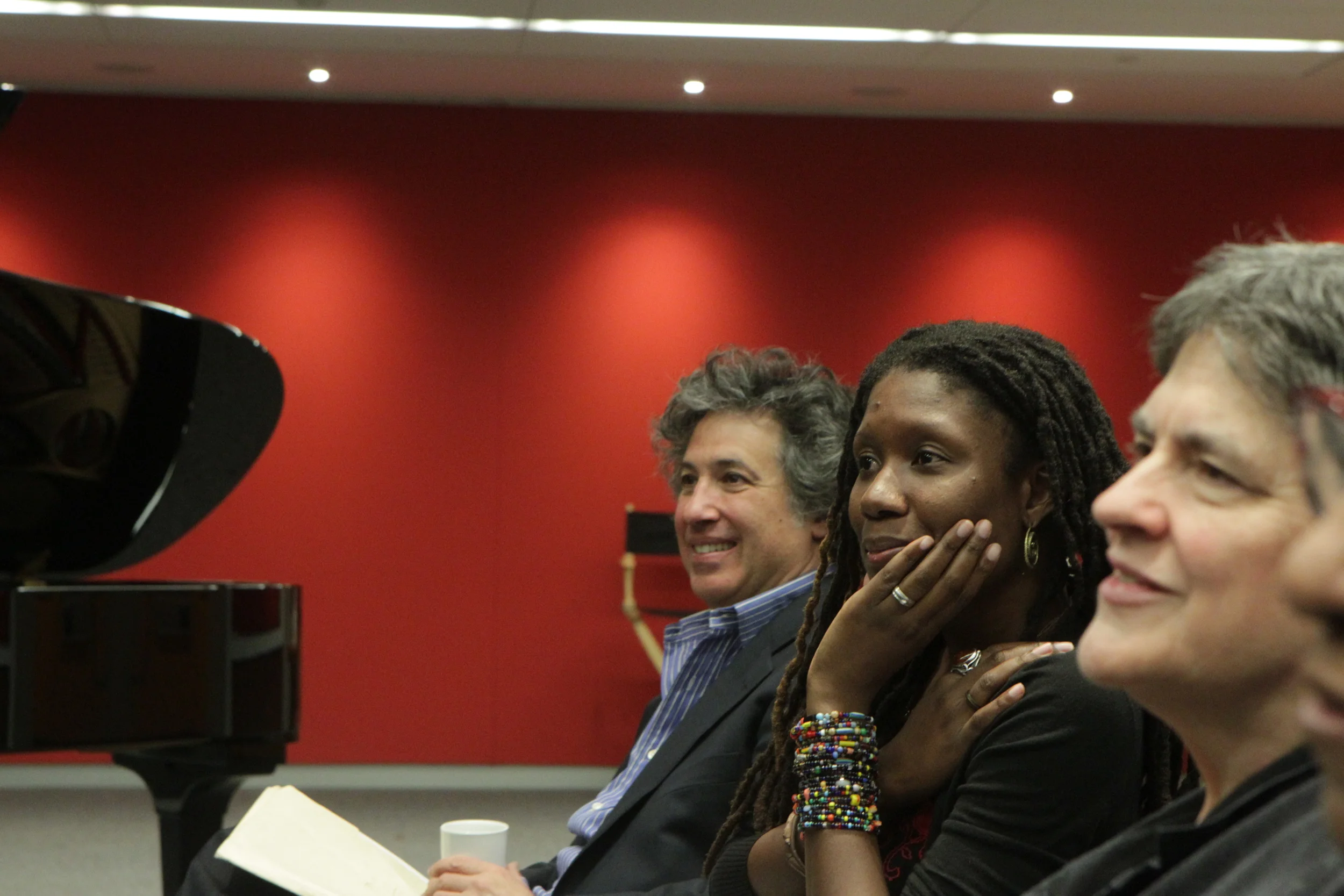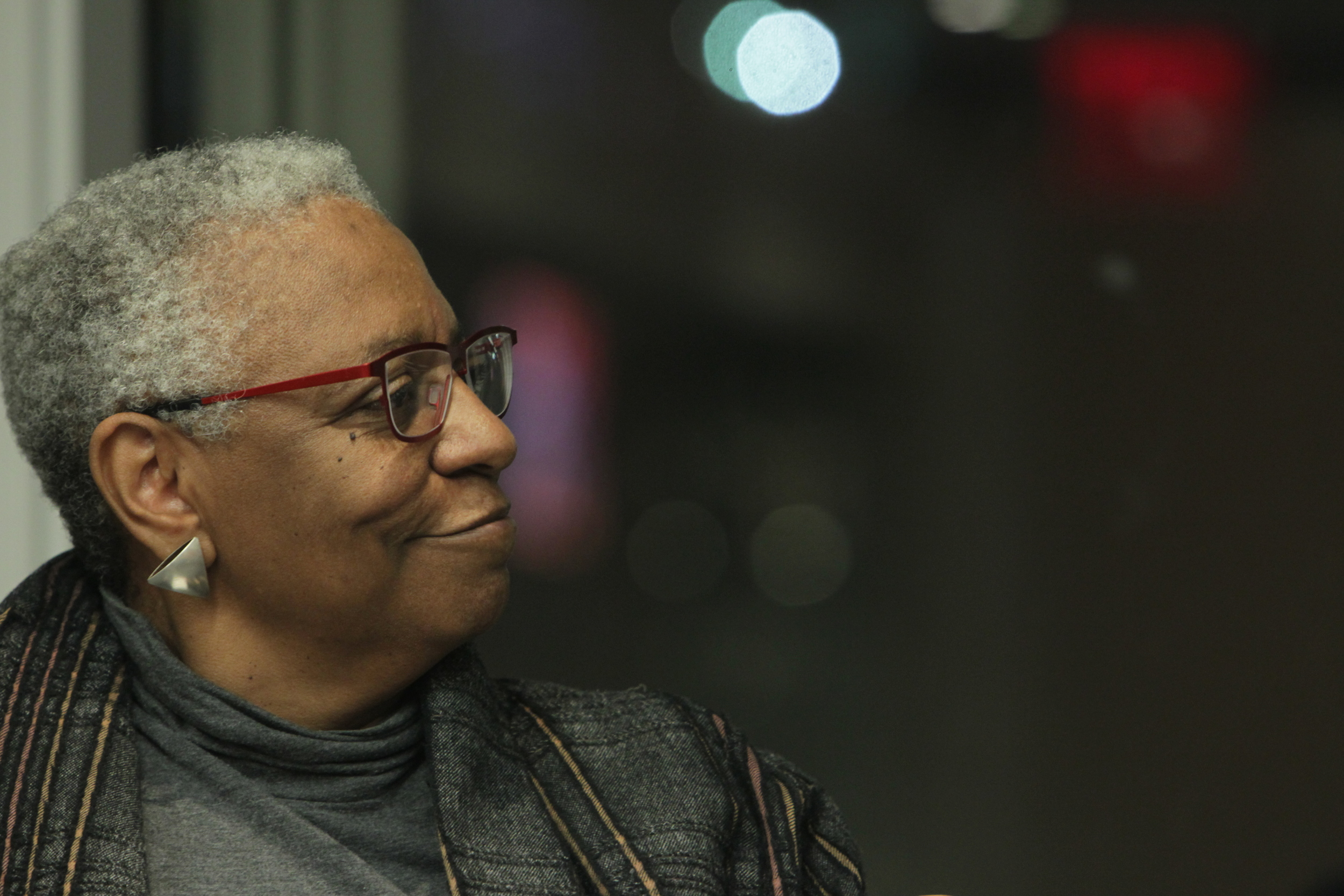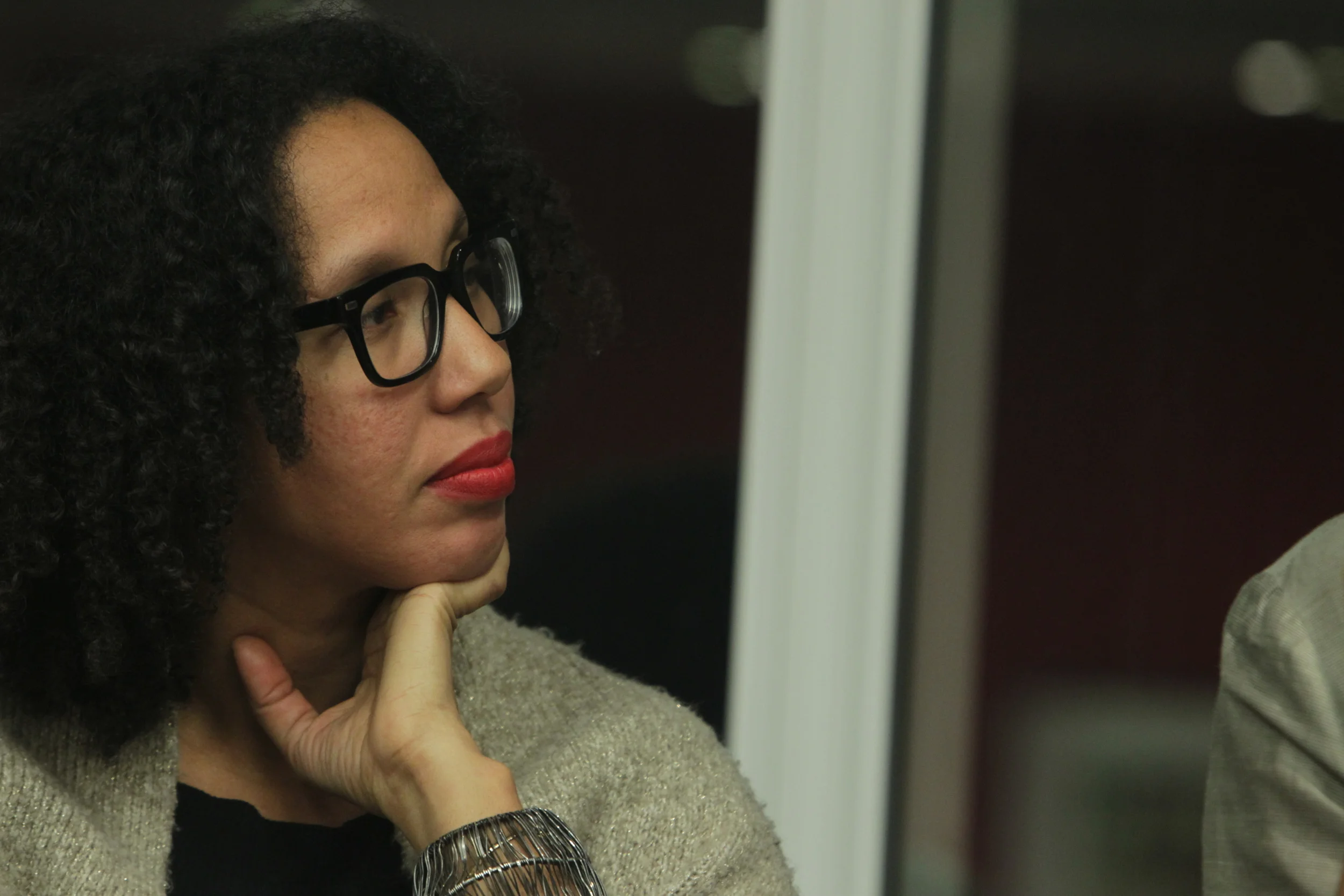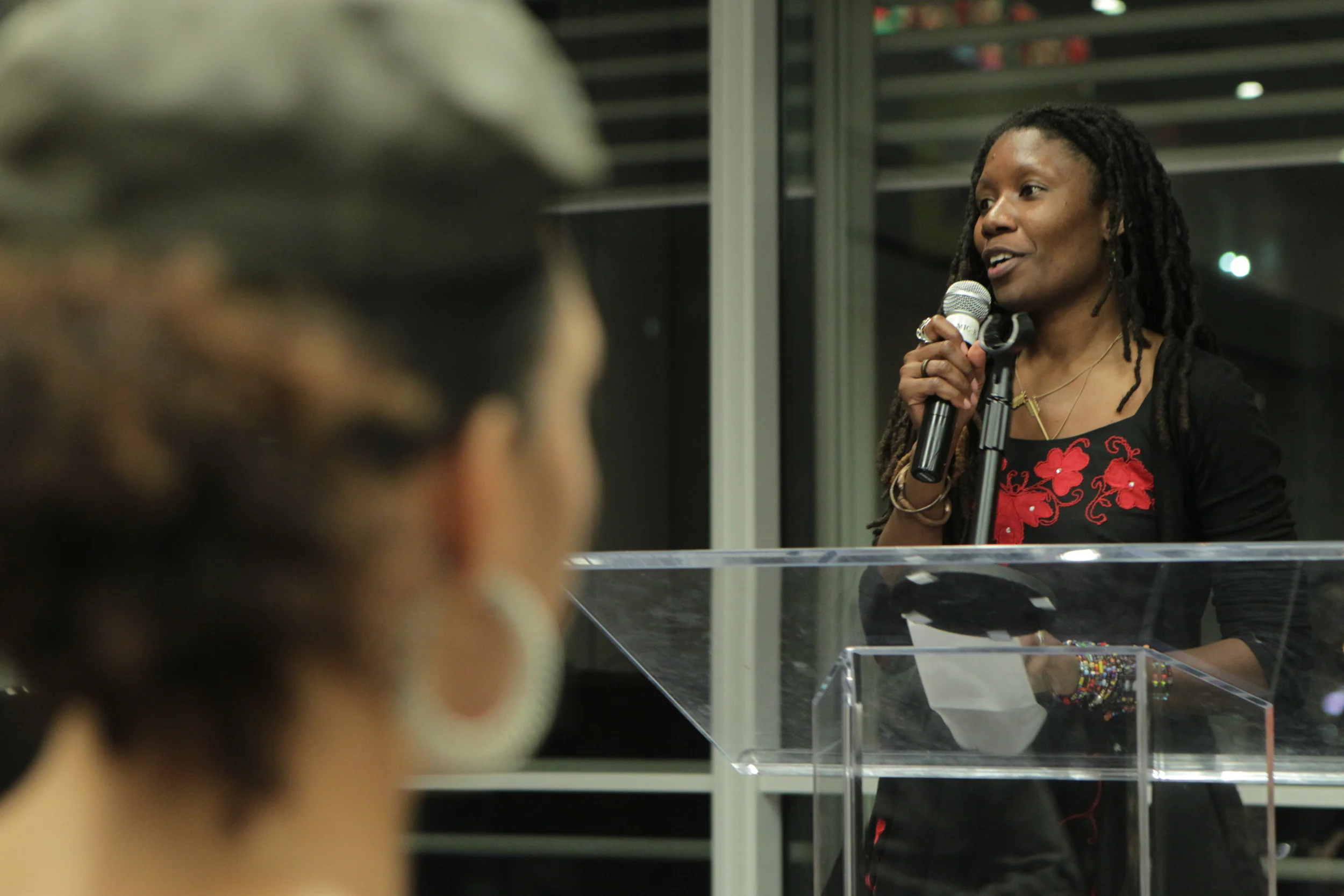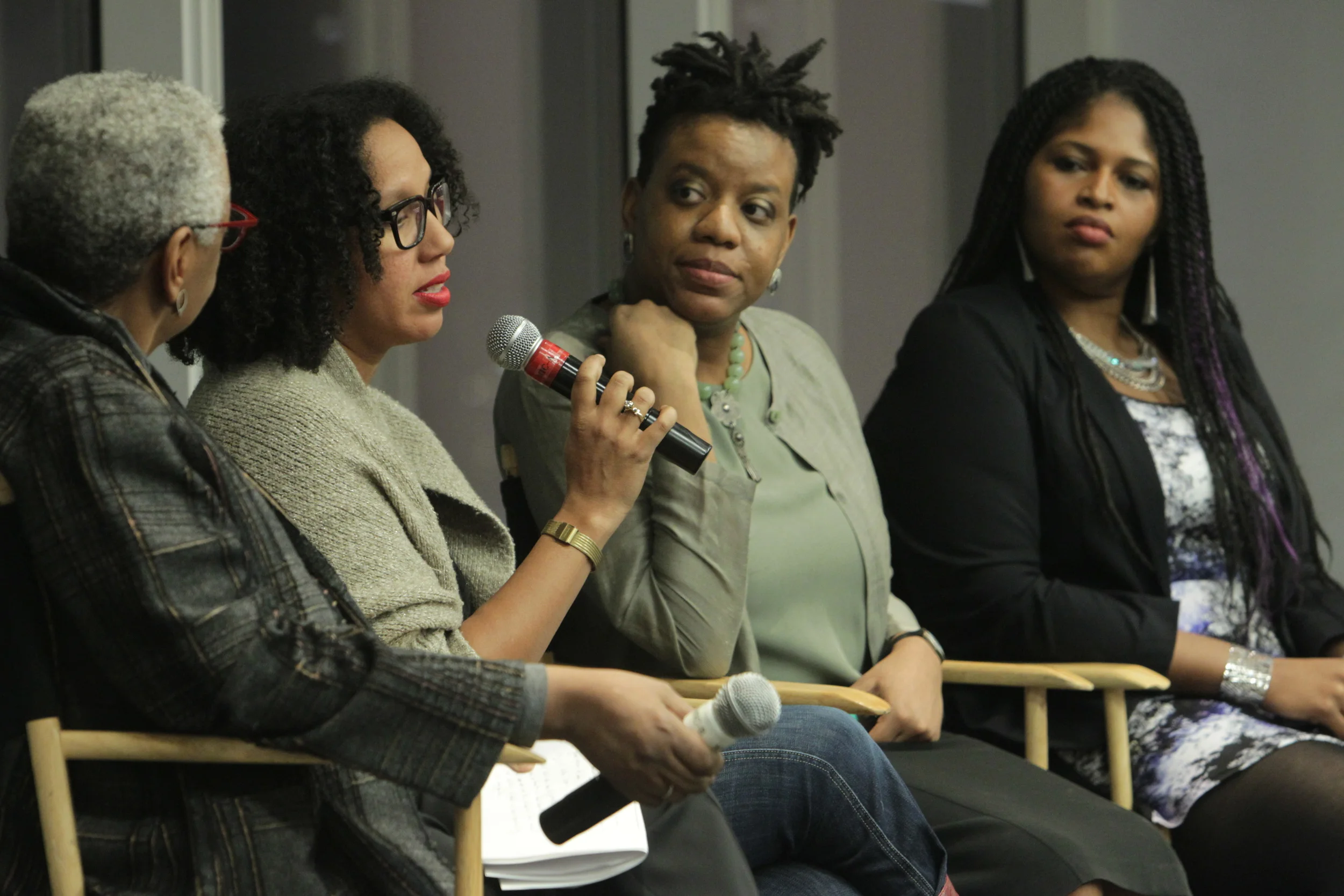Sex and Dialect in Black Feminist Fiction
DR. E. FRANCES WHITE: It’s really wonderful for me to realize that as I move towards retirement and reading whatever I want, that there really are these women writers that are coming along who are extraordinary and who will keep me happily reading for many years to come. I have to admit I come to this panel not as a fiction writer, but as a scholar trained in history. But I am someone who recognizes the importance of fiction for helping me see history, and to narrate the stories that turn chronology into history. So tonight I am going to ask you questions, but I will frame them as a cluster of questions. And I am doing that because I know that you are all complex thinkers and I want to give you the most room you can have to free up your fruitful answers. Okay? So I am going to start off with a historian’s set of questions. I want to know where, or if, you place yourselves in the long and distinguished history of black feminist fiction? Are there authors with whom you feel you’re in dialogue? Are there gaps that you’re trying to fill? Are there models? Or is this just the 1980s way of looking at black women writers? (audience laughter)
MECCA JAMILAH SULLIVAN: That’s a fantastic question. I absolutely locate myself within a tradition of black feminist fiction. But I don’t think that’s the only way of looking at things, although I do think it’s important for writers to locate themselves in that way, to articulate that and be clear about that. Many that might locate themselves in that tradition don’t always say it. I think there is something political and radical about making that claim. For me, there are so many models. But Toni Morrison is the go-to for me and most writers I would say in this tradition: Ntozake Shange, Cheryl Clarke, Jamaica Kincaid. And actually as a scholar, most of them are writers whose work I engage in my critical writing as well. For me, part of where I try to move the conversations of black feminist fiction forward, is in terms of conversations about sexuality, but also sexuality vis-à-vis body shape and size, experiences of the body. And so that’s a contribution that I attempt to make in my fiction. But absolutely, I think of myself as a black feminist writer.
If you’re familiar with Passing or with Quicksand, there was certainly same sex desire between women in those novels. It is present in my novel. It is absolutely not obfuscated. It is very in-your-face.
LaSHONDA KATRICE BARNETT: I love your questions. Loaded. When you were unpacking the questions, I was thinking of generational shifts in the way black women literary theorist Cheryl Brown has discussed generational shifts. I come to novel writing as a historian and as a literature scholar and I was very varied in my scholarship of black literature and always very moved by early black literature which I felt was very interested in depicting the entire humanity of black people and not stereotyping black characters, which I find prevalent in literature after the 1960s. I would compare my heroine Ivoe Williams to Iola Leroy in Frances Ellen Watkins Harper’s novel Iola Leroy which came out around 1890s at the end of the 19th century. And then from Frances Ellen Watkins Harper I would go to some of the writers from the Harlem Renaissance, Nella Larsen who wrote about same sex desire. But she did so in a very obfuscate way. If you’re familiar with Passing, or with Quicksand there was certainly same sex desire between women in those novels. It is present in my novel. It is absolutely not obfuscated. (audience laughter) It is very in-your-face. And in that way I make a very clear departure. Something very interesting begins to happen with black literature during the Harlem Renaissance. Because we were so preoccupied with abandoning the south and abandoning the idea of being shiftless, no count Negroes—all of the horrible stereotypes that have come out of slavery—because that happens, the literature becomes very much about what historian Evelyn Brooks Higginbotham at Harvard University calls “the politics of respectability.” So you see many novels where all of the black characters are sort of sainted and there is a sort of sidestepping away from sexuality in a very bold way. I believe that begins to change in the late 1930s when Ann Petry—who is one of my favorites, she’s an idol of mine—wrote The Street, which features an amazing protagonist, Lutie Johnson who is a jazz singer. Around this period, which is called realism, African American realism, characters are not so sainted. We’re literally dealing with the street. We see this in Wright. We see this in Petry. We see this in Zora Neale Hurston. From that point on, there is sort of a turning-your-back-against the sainted black or the educated black. I’ve been really searching for characters like Ivoe Williams. And this is not to toot my own horn, but I have not seen a novel that follows a black woman intellectually, an artist, someone who is interested in claiming her whole sexual self. I have not seen a novel like that in the last 55 to 60 years. And so, I claim all. I claim Toni. I claim Nella Larsen. But I also think that we are at a very, very interesting time in black literature because there are lots of different avenues. There are lots of different shoots in the beautiful Afrodiasporic tree. We have Caribbean writers, we are celebrating African writing and there is Black American writing. And we’re all going in very different directions, I feel. And I’m very excited to be writing during this time because I think that we’re in dialogue with each other in very interesting ways. And I’ll stop there.
TIPHANIE YANIQUE: I feel like you could just keep going on, LaShonda. It’s class and I’m loving it! (laughter) So maybe I will go about answering your question slightly differently. I grew up in the United States Virgin Islands and as was said in my bio (thank you Laura) both my mother and my grandmother who raised me were librarians. So I grew up reading a lot. In fact, I really think books saved my life, literally. But because we were in the U.S. Virgin Islands, I didn’t really grow up reading any Caribbean literature. We were, and still are, basically a colony of the United States and so I felt as if I grew up reading a wider array of American literature and located myself definitely in the tradition of Toni Morrison. When you said Temple of My Familiar, . . . ooh, girl. (laughter) I feel like a lot of people don’t even know that book. You made me so happy. Alice Walker. Nalo Hopkinson. So I felt very connected to these writers that I was being introduced to in high school. But I didn’t think that there was a Caribbean women’s tradition, and so my bold ass self thought that I was going to be the first one. Fucking crazy! (laughter) So I had to actually come up to the states for college and I took a freshman literature course with a really amazing teacher and realized that there was indeed an incredible legacy of Caribbean women writers: Louise Bennett, Jamaica Kincaid, Edwidge Danticat. We know these names now, but growing up in the Virgin Islands I didn’t know these names. So I would say that, since then, a big part of my journey, even the Fulbright that was also mentioned in my bio, was about finding that tradition, locating that tradition and placing myself in that tradition. I knew at some point, I wanted to be a woman writer. I wanted to be a feminist writer; I do not shy away from that. I wanted to be a black writer and I wanted to be a Caribbean writer and that meant finding my place in all of those traditions. So I continued to do lots of research and to be a student of all those traditions so that I can continually place myself into those rivers of knowledge and artistry.
DR. E. FRANCES WHITE: Very helpful. Glad to know that I’m not completely out of sync. You are great examples of this new generation. But two of you mentioned the question of sexuality and I want to ask you about that. Each book takes up the question of sexuality in very different ways. And by sexuality I don’t mean just queer sexuality. I mean everything from incest to budding love, failed relationships and even just great sex. But I want to know, how is it that you grapple with dealing so honestly about sexuality? And what were the dilemmas you faced in deciding to deal with sex and sexuality in the ways that you did?
My book deals with various kinds of sexuality. The incest is probably obvious in what I read tonight, that at least you hear it coming as a theme in the novel.
TIPHANIE YANIQUE: I feel like we are going now in reverse and so I’ll just start. My book deals with various kinds of sexuality. The incest is probably obvious in what I read tonight, that at least you hear it coming as a theme in the novel.
Land of Love and Drowning (Excerpt)
The novel took me eleven years to write. So I was working for a long time. Those of you who are writers in the audience, that sounds like an awful lot of years. But it actually allowed me to layer the novel with a lot of complexity that I probably would not have been able to accomplish if I had written it in three or four years. And so one of the things I knew that I wanted to do was to talk about the Virgin Islands as this sort of space that is both American and Caribbean. Often it is not acknowledged as either. As a body, I walk around in the United States and often I am told ‘oh, you know you’re not an American, you’re a Caribbean person.’ But when I am in the Caribbean, I’m told, ‘well you know you’re not Caribbean. You’re American.’ So I’m sort of nothing and the Virgin Islands is sort of in that space of nothingness. I wondered what that might mean for characters to embody that and to be that. And for me, that meant having characters who were grappling with their actual bodies and characters who were having to respond to particular types of patriarchy. The metaphor was based in colonialism, but in my novel it sort of becomes solidified in the bodies of these beautiful girls who are as gorgeous as the Virgin Islands is. For me, a lot of the sexuality is doing that metaphoric, political work.
LaSHONDA KATRICE BARNETT: So my novel begins in 1897 and it ends in 1925 and my protagonist is a lesbian.
Jam on the Vine
So one of the first challenges that I came up against was how to contextualize her within a culture because, first of all, the term lesbianism is not even embraced when she is discovering her sexuality. This is certainly pre “the bar scene.” So I had to figure out a way to connect her to a community. And actually, she told me herself that she was a race woman and her race work was the most important thing to her. So that solved that. When I’m dealing with the relationship she has with the woman that inspires her to launch the newspaper—her former printing teacher from college who is fourteen years her senior—I talk about their love. I discuss their love in very private terms because, historically speaking, they would not have had a social world to be a part of. They are African American club woman and so they have a lot of home social activity. They have a home together and they have women in their home and they are very much about the business of race work. It is very important for me. It was a conscious decision to make my protagonist a lesbian because I feel that one of the ways that homosexuals have been very maligned in this culture, is that they have been divorced from history. Homosexuality is, politically speaking, a sort of recent phenomenon, since Stonewall, since Judy Garland’s death, since gays took to Christopher Street and rioted in June of 1968. And we know this is ridiculous. But when you read literature and when you read history books, you never see homosexual people that are part of the narrative unless they are artists. If you’ve been a writer or a musician or a dancer or a Broadway actor, then you can sort of finagle your way into the history. Ivoe is none of those. Ivoe is a journalist. She is a social activist. And so I pretty much wanted to write gay people into literary history which is why I made my protagonist a lesbian. And also that was a natural choice. (laughter)
If you want full characters they have to engage in full worlds. And for me that means even my queer characters. There is nothing homonormative about any of [them].
MECCA JAMILAH SULLIVAN: I’m so glad that you mentioned the politics of respectability earlier. Any kind of politically and socially circumscribed cultural standard, when imposed on an entire group of people, is going to limit representations of those people. If you subscribe to that kind of politics, you cannot write a full character because the character is so busy representing a race or a gender or a fantasy of a kind of human so they can’t actually be a full person and can’t have a full life. So for me, writing queer characters is really sort of writing characters that get to be full, that get to make various choices, that are able to sort of live and breathe and experience things beyond being in constant dialogue with this externally imposed cultural norm. They can be full and have their lives and their lives can take them beyond the bounds of what we want black myth to look like or what we want womanhood to look like or queerness. So that’s where I think about Audre Lorde. I should have named her first. There is her notion of the single issue framework. She said that any political movement that focuses on a single issue is bound to fail even the members of that movement because we do not live single issue lives. And it really is not too much of a leap to think about that as a call to a certain perspective on craft as writers. If you want full characters they have to engage in full worlds. And for me that means even my queer characters. There is nothing homonormative about any of my queer characters. None of them have gotten married yet. Maybe that will happen at some point. But they are living lives that at least allow them to be outside of whatever the norm is. It’s important to me. You also said it towards the end of your last comment. It’s also an easy choice. On one hand there is something very deliberate and I’m aware there is something radical about those kind of choices. But I also just want to write the characters that I need to read. So for me, it’s natural to let these characters be who they are, to listen when they tell me this is what I’m about, this is what I do, this is what I’m invested in.
Sererie by Mecca Jamilah Sullivan (a short story from forthcoming Blue Talk and Love collection)
But as you framed your questions, it was interesting that you asked what kinds of barriers there are to making those choices. I think those barriers do exist. I don’t know if you all feel this, maybe you are further along than I am, but there is that voice in the back of your mind: oh what is my mom going to think? (laughter) Right? My mom is right there (in the audience). There is something to acknowledging that as well. You do have to navigate those aspects.
LaSHONDA KATRICE BARNETT: I wrote the sex scenes with my eyes closed. I typed those scenes with my eyes closed because I thought my parents are still on the planet and they are going to read this. I was very stunned when I sent a draft down to Kansas City and my stepfather called and we were talking about the book and he said ‘before I let you go, I just want to say that your love making scenes are beautiful.’ And I was like, ‘it’s so gross.’ (laughter) But I think it is really important to write them. I really wanted to write very bold scenes. My senior thesis in undergrad was on romantic friendships in 19th century lesbian literature. So I looked at the short stories of people like Constance Fenimore Woolson—who was the niece of James Fenimore Cooper, who wrote Last of the Mohicans—Sarah Orne Jewett, and all of these middle class white woman writers who were writing about Boston marriages. Woman who lived together, who shared the same bed, but they weren’t lesbians. Right. Boston marriages. And I was fascinated with this literature and fascinated with the way it was encoded and I thought to myself even as I was writing my thesis, if I ever get my shot, it is going to be in your face. I’m not going to encode anything. So I did struggle with my own exhibitionist self, but that was the extent of it. (laughter)
E. FRANCES WHITE: Do you want to respond to that? Because I was thinking as all three of you were talking, well how did you all escape the politics of respectability? Because it certainly has dogged me all my life. (laughter)
TIPHANIE YANIQUE: Yo, . . . of course, I was petrified. I have sex scenes in my novel as well. Land of Love and Drowning took me about eleven years to write. In about year nine, I showed the novel to all my grandmothers‘ living children. This was important in part because the book is based on my sort of family mythology. My great grandfather was indeed a ship captain and I’m not spoiling anything to say that he went down when his ship sunk and that changed our family trajectory in a really radical kind of way. My grandmother was his baby. She was three when he died. And she was supposed to have a very genteel life as a captain’s daughter, and her life really went a radically different way. I was raised by her, so I was raised with that sort of new version of our family. But I was raised in this really funny way. So I grew up very poor, in the hood neighborhood of the Virgin Islands, the places that they veer the tourists away from when they come. (laughter) But, at the same time, since my grandmother had raised me, I knew how to hold a teacup and which spoon to eat with. I had his weird sort of balance where we might eat bread and sugar sandwiches for days, but you knew how to hold a bread and sugar sandwich. (laughter) So it was a weird kind of thing. So the idea that I was going to write a sex scene (or many sex scenes), was kind of devastating. But I did it. My aunts are all so wonderful and lovely. But I had one aunt who I sent the book to and she never read it. ‘Oh you know we love you,’ she said. I had one aunt who read it and was very supportive and loving. And I had another aunt who read it and said that she would never speak to me again if I published it. And one of the reasons was that there was too much sex. Her mother was my grandmother. She said ‘you have my mother having sex.’ And I said, ‘well your mother had sex you know. You’re here.’ But she was very upset about it. If there is opportunity later, I might talk a bit about what happened with me and my aunt. But basically I didn’t take the sex scenes out. I just felt that they were very important, not for salacious reasons, but for my novel in particular, for really important narrative reasons. And also for beauty reasons. One of your earlier questions was about love and I think that ultimately love is vital. It is the only vital thing actually and we should write about it. For me, it’s key. I think it’s probably my theme. My always and forever theme is to write about romantic love and to take it seriously. I think as writers we think we shouldn’t write about romantic love because that is garbage. That’s for Danielle Steele, etc. We’re literary writers and we should write only about ideas and stuff. But love is an idea too and a serious and important one. And so I write about it, and obviously that means that you have to write about sex.
DR. E. FRANCES WHITE: Well thank you. I’m glad to see that you’ve had some of the same struggles I’ve had. Respectability is interesting and families have very different ways of instilling it and I suspect that there are some ways we all share some of the same upward mobility stories. But I come from a working class family and one of the things that my mother insisted on was that we speak standard english. And as the youngest in the family, I was always the one who was corrected by everybody. So I’m the one who remembers that the most. But when I read these three texts, one of the great things about them is that these women have ears for hearing different voices, voices that represent different classes. So I’m wondering, how is that you go about dealing with classes? How do you place yourself in a long tradition of trying to represent black english? It is a tradition that has many terrible failures, but also some wonderful examples. So I’m wondering, how did you struggle with that question about the vernacular, about black english, about representing different classes?
The first day of workshop, she walked in and she said ‘I hate dialect’ and I knew that she was talking to me. My whole book was written in dialect the first time. And I took offense. I said that I was the daughter of Zora Neale Hurston and we just went to town.
LaSHONDA KATRICE BARNETT: I have a very funny story along those lines. I had written a draft of Jam and had read Away by Amy Bloom, which blew me away because it is a historical novel and I read it in one sitting. And usually that doesn’t happen with historical novels. So I was very taken with it and found her and went to study with her at Provincetown. The first day of workshop, she walked in and she said ‘I hate dialect’ and I knew that she was talking to me. My whole book was written in dialect the first time. And I took offense. I said that I was the daughter of Zora Neale Hurston and we just went to town. And I said that I had a degree, a BS in linguistics and this is not just dropping g’s and adding commas to emulate Paul Laurence Dunbar. I have worked out a whole semantic and syntactical whole language and I am just arguing with her. And she said it slows the reader down. Tell me another reason why you are using dialect. And I said to her— because this was my number one reason—for cadence. And she looked at me and she said ‘leave the workshop. Go back to your dorm room and write it in the king’s english—which Toni Morrison uses by the way. She’s never written a word in dialect.’ And you know, she was kind of rubbing my nose in it. And she said read it out loud and tell me if your cadence has changed. Because cadence has nothing to do with spelling, LaShonda. Cadence is syntax. And so I went back to my room and I wrote two pages over, in the king’s english, and I chose two pages with different characters speaking from three different generations and she was right. And so I think that it is a very personal question about vernacular and about dialect. My particular reason for wanting to use dialect was because I really felt that it affected the sound. But it absolutely did not affect the sound. When I took all of the dialect out and wrote it in the king’s english, Lemon’s voice is still very distinct. In fact, I worked very hard on the novel to not say character A said or character B said. They each speak so differently so that you never needed a directive on who is saying what because you know their personalities. The personalities are embedded in the language and so you don’t have to say to the reader ‘Josie said’ or ‘Michael said’ or ‘Thomas said.‘ I was able to do that in the king’s english and at the end of the day Amy was right. With me, I did not need dialect for cadence. But I certainly have black english. The idiomatic expressions that are used are there. But you know that’s an interesting thing too, because if you are in the south and you hang out with white people in the south, and you’re real, you hear very little difference. There is an intimacy below the Mason-Dixon line southern that you do not experience in the north, especially during the time period that I am writing about, the progressive era and the Jim Crow era. So it’s black language, but it’s also black language that the white people would have been speaking, and that white people would have been very very familiar with. Idiomatic expression and culturally speaking, there’s a blackness there. But it’s not dialect.
DR. E. FRANCES WHITE: It sounded Texan to me.
LaSHONDA KATRICE BARNETT: It takes place in Texas and Texas was there at the whole of the story. But I was blown away by how multicultural Texas was. We think New York is multicultural in the 21st century, but it is unbelievable how multicultural Texas was in the 19th century. But I was very concerned with place. And place, in a way, trumped race, in certain parts of the novel.
[T]hat nuance that is located in the voice is really crucial, is really important and I don’t want to give that up. My characters, for the most part, either they all enjoy their own voices, or they enjoy the process of coming to voice. I want the reader to be on that journey with them.
MECCA JAMILAH SULLIVAN: I see voice as a kind of vehicle for the interior and for the intellect. To me, the aesthetic qualities of the voice convey information about the interior, about the person who is speaking. Your voice is not only a sound that is produced by your vocal chords, it is also your way of thinking, it’s your perspective, it is your way of looking at the world, your personal history. It comes back to that question of complexity. For me it’s important to allow my characters to express their interior, to express their intellect in the ways that make sense given their experience. I think that it does come back to the politics of respectability in one sense. A sort of representation is another way to think about it. I want my characters to represent the fullest possible extent of their humanity as black people, as women, as black queer women. For me, that means that nuance that is located in the voice is really crucial, is really important. And I don’t want to give that up. My characters, for the most part, either they all enjoy their own voices, or they enjoy the process of coming to voice. I want the reader to be on that journey with them. As a writer, I enjoy voice, having that ear. I love listening to people talk. And I want my characters and my readers to be part of the process of the construction of and dissemination of voices that they may not have heard. And for me that takes me into vernacular, that takes me into dialect, sort of cultural idioms and multilingualism of varying kinds. It is also about beauty. There is a beauty in language. There are many beauties in language and I think that it is still really important to emphasis the beauty in language that is perhaps not always thought of as beautiful.
I wanted even my omniscient narrator to have language that was particular to the story that she was telling. So I used different versions of english. And in my opinion, versions of english that vary from what we might call the king’s english or the queen’s english to very vernacular caribbean english.
TIPHANIE YANIQUE: I was trained first as a poet, so for me that has meant that language is always the thing, no matter what. So I think that for many fiction writers, prose writers, plot is the thing that moves forward, character is the thing that moves forward, that keeps you moving. But definitely in my first drafts, the language is what I follow and what I allow to take me towards plot and towards character. So no matter what language that I am using, I think that I really hunt that language down. For this novel in particular, because I knew that I was writing a novel on place, of a people. Just to reference your earlier question about trying to fill voids, . . there isn’t a Virgin Islands literature. And I knew that I wanted to really write towards that possibility. There are definitely some poets and children’s book writers who are being published in the Virgin Islands, but they are certainly not being taught in the Virgin Islands so I didn’t grow up reading them. And so I really wanted to be writing towards a possible making of a literature. So I’m writing this first novel and I have this big ambitious idea and I thought that the only way to really do that is to have the people themselves talk. So I have Virgin Islanders of different kinds actually speaking. So my novel is written with five different narrators, four first person narrators and a fifth omniscient narrator. But even when I write that omniscient narrator, I’m aware that even omniscience has a positioning, even omniscience has an opinion and has an angle of vision and has a way of understanding that subject matter is narrative. So I wanted even my omniscient narrator to have language that was particular to the story that she was telling. So I used different versions of english. And in my opinion, versions of english that vary from what we might call the king’s english or the queen’s english to very vernacular caribbean english. I even have characters who change over the course of the novel as they come to different understandings of their identity. And that was a craft decision, but it was also a political decision. I was really consciously trying to write a novel that was going to express Virgin Islandness and that meant using language and using the voice. Now I don’t spell differently. So I don’t use phonetic spelling. I didn’t feel the need to use phonetic spelling, maybe because of what Amy Bloom was saying. I don’t know. I never met the woman, but she so smart now. (laughter) But I felt that I could capture the rhythm of these various versions of english by just looking at syntax and language and word choice and grammatical structures. So all of those things are present.
Now I teach a class at the New School called Writing the Other and often I have students who want to write outside of their own organic experience, like you know, they are very obvious (a white guy who wants to write a black character, a straight guy who wants to write gay characters). And one of the things that often happens when the otherness is ethnic, is that people want to employ vernacular or some version of dialect to do that. And mostly they fuck it up, in my opinion. So what I tell my students is that vernacular, what we call dialect or patois or creole is a language. You have to think of it as a language. And you have to be fluent in that language or you cannot really employ it. So you wouldn’t go try and write your novel in French right, because you don’t speak it right? (laughter) So you wouldn’t have your characters speak in Spanish if you don’t know no Spanish. So why would you do that with vernacular. I tell my students if you really want to do this crazy thing------first of all, don’t do it-----(audience laughter), but if you’re gonna do it, then do it with care and with a lot of education. Go make yourself fluent in that language, because not only is it disrespectful and you’ll probably do a lot of stereotypical type stuff. But you’re not going to be able to capture the beauty of that vernacular. You’re not going to capture the poetry of that vernacular. Because the vernacular, the patois, the creole has its own beauty. And often what ends up happening is you use perceived understandings and often the creole or the dialect is used as a point of humor, like that’s a character who’s stupid in the book. That’s the character who’s the buffoon in the book, instead of that’s the character that’s brilliant in the book. And you can only have a brilliant patois speaker if you know the patois. So I really encourage my students and my fellow writers to think carefully about the use of the vernacular.
DR. E. FRANCES WHITE: It is about that time. I’m devastated to say we’re going to have to wrap this up. I just want to say then that these really are unique books taking on American imperialism, illustrating Ida B. Wells, putting me in touch with a much younger, really savvy group of women. They were unique in the way they did that and I think because they are all new, my guess is that you haven’t had a chance to read them. I recommend them highly. Thank you all for coming.





